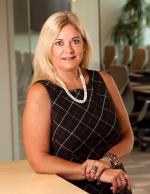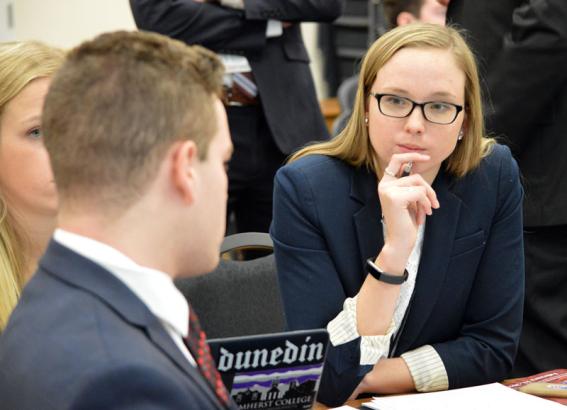Fifth Annual Women of Isenberg Conference Empowers Hundreds of Students
March 21, 2018
“It isn’t working hard that gets you recognized. It’s working smart,” emphasized Victoria Vega ’88, keynote speaker at the 5th annual Women of Isenberg Annual Conference* on February 24. Vega’s remarks formed the basis of a prevailing theme throughout the day-long conference, which stressed a changing landscape for women in the workplace and the importance of finding one’s own way even in challenging circumstances.
Vega, who is the Cross-Sector Operations Vice President with the food service innovator, Unidine, shared insights and advice with 440 students, alumnae, and educators in a standing-room-only UMass Amherst Campus Center Auditorium. Illustrating her points with vivid anecdotes from her career, the Isenberg Hospitality and Tourism Management (HTM) graduate explored mentorship, networking, assertiveness, interviewing strategies and tactics, employer cultures, crisis management, and other timely topics.

Vega’s keynote address shared highlight honors with fifteen breakout session panels and workshops, a plenary lunch panel devoted to career turning points, and a career reception that brought students together with the event’s industry sponsors and Isenberg alumnae. The panels and workshops—each running 50 minutes and comprising a student moderator and several alumnae/industry professionals (often including an Isenberg educator)—covered a wealth of topics. Separate panels addressed leadership styles, work/life balance, networking, diversity and inclusion, making it to the C-Suite, and other concerns. Workshops homed in on sexism and sexist language at work, evaluating job offers, public speaking, managing social styles, and leadership lessons from the recently published volume, Mom B.A, authored by a UMass alumna, Karyn Schoenbart ’78.
Planned and orchestrated by a committee of seven Isenberg students,** the day’s events ran seamlessly. Saluting the students, Isenberg’s dean, Marc Fuller, emphasized that “the ability to practice greatness” is no less valuable than talent itself as an ingredient in building leadership. The student planning committee’s members, he continued, have excelled as “people who can lead.” They have shown “how deliberate practice [a hallmark of education at Isenberg] makes leadership.”
Vega’s Advice on Career Strategy
“Thirty years ago as a student, it wasn’t about competing with graduates from Cornell and UNLV [as Isenberg HTM students do today]; it was about competing with each other,” Vega confessed. “I leveraged every opportunity that UMass gave me.” That included participating in a hotel work/study program in Switzerland that offered a springboard to travel throughout Europe. And, as student chair of HTM’s Career Day, Vega significantly expanded her professional network. In her senior-year interviews with employers, she formatted her resume as a menu and framed herself as “a root, not a weed,” for prospective employers.
"It wasn’t just about money; it was about shared values.”After graduation, Vega joined food services stalwart ARAMARK, leaving nine years later as a general manager. Over the next eleven years, she ascended the corporate ladder at Restaurant Associates, ultimately gaining responsibility for 23 corporate client locations yielding $44M in sales. Since 2013, she has thrived at progressive, Boston-based Unidine, where she has earned four significant promotions. At those and other firms, she gained hard-earned insights, which she enthusiastically shared with her audience.
Lateral rather than vertical career moves, Vega remarked, may prove the “smart, though not obvious, career choice.” Adversity builds character, she emphasized, recalling her crisis management challenges in leading a food services team in the midst and wake of the World Trade Center towers disaster in 2001. That tragedy, she said, motivated her to lead with greater empathy and appreciate distinctions between management and leadership. And, she underscored, seek a corporate culture that dovetails with your own values. “At Unidine, the culture blew me away. It wasn’t just about money; it was about commitment to shared values.”
Lunchtime Thoughts on Career Turning Points
Like the keynote speaker, four panelists in corporate financial leadership positions with conference sponsor United Technologies (UTC) recounted some of their own challenging career turning points. After UMass, Melinda Mitchell ’13 MBA began her career with UTC’s Pratt & Whitney division by diving into a sea of “unfinished projects.” “The process was broken and needed to be resolved. It brought me to the next level,” she remarked. Also at UTC, Susan Keegan ’92 “jumped from aerospace to corporate financial planning.” For her, that “leap of faith” opened up the organization’s other sides and its big picture. Deb Carreau (UMass Boston), who also rose to new challenges within the firm’s different businesses, framed her moves less drastically as “measured risks.” With that said, Angela Ceppetelli ’89, who embraced manufacturing after 12 years in commercial roles at UTC, offered her own timely advice: “Own the truth of every situation and find strength even if you perceive it to be negative. Leadership and success are not cookie cutter undertakings.”

Women in Technology
Earlier in the day, a breakout panel of three recent graduates and an Isenberg professor offered their own insights on technology-focused careers. Women with technology skills—notably information technology—enjoy sellers’ markets in securing challenging and financially rewarding positions across a broad range of industries, the panelists agreed. That’s because demand for tech is so pervasive. “Tech is in every job now; everybody is involved,” emphasized Bianca Tamaskar ’16, who works with EY’s Forensic Technology & Discovery Services team in Boston.
“If you have the credentials, I just hire you at your price point,” added Julia Barth, a partner and director of project management with Sovereign CRM, a young, fast-growing consulting firm, also in Boston. While that goes equally for both sexes, women in IT, she continued, should prepare for work in a “boy’s club.” As for sexist behavior: “You need to call that out,” Barth continued. “Often they don’t realize what they’re doing. And sometimes, there’s an advantage being the only woman in the room. They treat you differently; they make eye contact.”"As long as you’re confident, you’ll be respected."
“As long as you’re confident, you’ll be respected,” added Alyssa Moore ’16, a member of EY’s risk advisory staff. “That includes pointing out inappropriate comments,” she noted. “At EY you have to prove yourself. I never felt that being a woman held me back.” Women, in fact, often reap advantages via their more nuanced interpersonal skills set, added Barth.
By bringing your best, you can count on significant rewards, observed Renee Pratt, a professor of Operations and Information Management who joined Isenberg with considerable industry experience in information systems and web and database design. But, she continued, don’t leave money on the table: Be assertive in negotiating wages! And, she added, you don’t need a pure math background [like Pratt herself] to succeed in tech. You can do quite well by transferring skills like portfolio analysis, data analytics, and problem solving into a career in technology. “It has taken us time, but we as women have seen major changes in the workplace,” emphasized Dr. Pratt.
*Principal Sponsors: United Technologies, Isenberg Family Charitable Foundation, Women for UMass Amherst, DCU, TJX, EY, Eaton Vance, KPMG, Identity Force, Liberty Mutual, Isenberg Dean’s Fund for Excellence
**Erin Messier ’18, Alexandria Eisenhardt ’18, Carly Griffin ’18, Mackensie Wise ’19, Sam Boardman ’19, Rebecca Cooper ’20, Emma Jopson ’20









